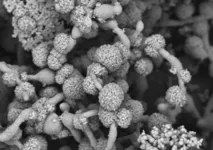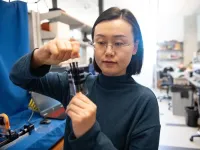The key role of Galectin-3 in brain tumour development
University of Seville researchers describe how inhibition of this protein significantly reduces glioblastoma size and brain metastases
2024-05-03
(Press-News.org)
A research group at the Department of Biochemistry and Molecular Biology of the University of Seville has made a significant advance by discovering the crucial role of the protein Galectin-3 in the progression of various types of brain tumours. In these tumours, the most abundant immune system cells, microglia and macrophages, overexpress Galectin-3, which creates an immunosuppressed environment which inhibits the action of other immune cells against cancer cells.
In vitro findings have shown that specific inhibition of Galectin-3 in microglial cells promotes expression of proinflammatory markers and reverses the presence of key immunosuppressive biomarkers. In vivo models of brain metastases of breast cancer and glioblastoma, two of the most common and aggressive types of brain tumours in the population, have validated these results. In genetically-modified models where Galectin-3 was knocked out, microglia cells and macrophages displayed a more inflammatory and anti-tumour state, leading to a reduction in the size of primary tumours and brain metastases by up to fivefold.
These results, although preclinical, have clear translational potential. Thanks to collaborations with Lund University, the research group has access to the TD006 antibody, a selective inhibitor of Galectin-3 currently being tested in clinical trials in Alzheimer’s patients. The team is currently working to improve Galectin-3 inhibitors so that they can improve their efficiency in reaching brain tumours, as well as researching their use in combination with other conventional therapies such as radiotherapy and chemotherapy.
END
ELSE PRESS RELEASES FROM THIS DATE:
2024-05-03
The University of Copenhagen is excited to announce Junevity as a Tier 3 Sponsor of the 11th Aging Research & Drug Discovery Meeting, the world's largest conference on aging research in the biopharmaceutical industry that will transpire on August 26 - August 30, 2024 on-site at the Ceremonial Hall, University of Copenhagen, and online.
Junevity is rewinding diseases of aging with novel transcription factor medicines. Based on 6 years of breakthrough research at UCSF, Junevity's REWINDTM platform identifies new targets based on large-scale genomics, machine learning, and cell aging experiments. Junevity is advancing multiple therapeutic programs towards ...
2024-05-03
Climate change will cause an increase in extreme winter storms combining strong winds and heavy rainfall over the UK and Ireland, new research has shown.
The new study was led by experts at Newcastle University and the Met Office and investigated how future climate change may influence compound wind-rain extremes, which are events where extreme wind and rainfall occur simultaneously.
The researchers analysed data from climate simulations covering control (1981-2000) and future (2060-2081) periods, ...
2024-05-03
Researchers working on solutions for antifungal resistance are being encouraged to apply to a new £3.4 million fund led by the University of Exeter with UK government funding.
The new fund, called FAILSAFE (Fungal AMR Innovations for LMICS: Solutions and Access For Everyone), is being launched by the University of Exeter’s MRC Centre for Medical Mycology, in partnership with the UK Department of Health and Social Care’s Global AMR Innovation Fund (GAMRIF).
Life-threatening fungal diseases take as many lives annually as TB or malaria, but the organisms ...
2024-05-03
Evidence from archaeological sites in the medieval English city of Winchester shows that English red squirrels once served as an important host for Mycobacterium leprae strains that caused leprosy in people, researchers report May 3 in the journal Current Biology.
“With our genetic analysis we were able to identify red squirrels as the first ancient animal host of leprosy,” says senior author Verena Schuenemann of the University of Basel in Switzerland. “The medieval red squirrel strain we recovered is more closely related to medieval human strains from the same city than to strains isolated from infected ...
2024-05-03
The first panoramic view of infection pathways in the human placenta has been created, which could highlight potential drug targets to develop pregnancy-safe therapies for malaria, toxoplasmosis and listeria, all diseases that can cause severe pregnancy complications.
Researchers from the Wellcome Sanger Institute, the University of Cambridge, the University of Dundee, and collaborators, used novel ‘mini placenta’ models to map the placental response to infections in early development. This ...
2024-05-03
Researchers at the University of Basel and the University of Zurich have been able to prove that British squirrels carried leprosy bacteria as early as the Middle Ages. Further results revealed a link between the pathogens found in the medieval rodents and those in the local human population during that period.
Skin spots, deformed noses, ulcers: leprosy, is an infectious disease that can bring about some serious symptoms. The bacterium responsible, Mycobacterium leprae, which still infects around 200,000 people each year especially in the Global South, also has a long history in Europe. The international research group led by paleogeneticist Professor Verena Schünemann ...
2024-05-03
The Foundational Questions Institute, FQxI, a philanthropically-funded science funding agency and think tank, is delighted to announce that Dr Pinar Emirdag has been appointed to the Institute’s Board of Directors.
Emirdag, a financial services executive and entrepreneur, is currently director of Hupomone Ventures, having previously spearheaded industry-changing initiatives at institutions such as JP Morgan, Citi and the London Stock Exchange and at start-ups including Lava Trading and Clearmatics. FQxI’s Chief Operating Officer Kavita ...
2024-05-03
A first-ever stretchy electronic skin could equip robots and other devices with the same softness and touch sensitivity as human skin, opening up new possibilities to perform tasks that require a great deal of precision and control of force.
The new stretchable e-skin, developed by researchers at The University of Texas at Austin, solves a major bottleneck in the emerging technology. Existing e-skin technology loses sensing accuracy as the material stretches, but that is not the case with this new version.
"Much like human skin has to stretch and bend ...
2024-05-03
A common challenge in shipping occurs when ships arrive promptly at their destination, only to find a crowded harbour. Subsequently, they are often required to wait outside the harbour or anchor until port services and a quayside become available.
According to a report from the International Maritime Organization (IMO), it is not uncommon for ships to spend between 5-10% of their time waiting to enter port. Excessive speeds followed by extended waiting times with engines running result in a notable increase in fuel consumption. This is a problem that impacts both the climate and the economy.
Several European universities, ports, shipping companies and technology firms have now joined forces ...
2024-05-03
The interest in antimicrobial solutions for personal and multi-user touch screens, such as tablets and mobile devices, has grown in recent years. Traditional methods like sprayable alcohols or wipes are not ideal for these delicate displays. Antimicrobial coatings applied directly to the glass are a promising alternative, but only if they are transparent and long-lasting. Previous proposed coating solutions, such as photocatalytic metal oxides (e.g., TiO2 and ZnO), have posed some challenges. Additionally, these coatings typically require light and moisture to be antimicrobial and eliminate the microbes present on the surface.
Copper ...
LAST 30 PRESS RELEASES:
[Press-News.org] The key role of Galectin-3 in brain tumour development
University of Seville researchers describe how inhibition of this protein significantly reduces glioblastoma size and brain metastases





